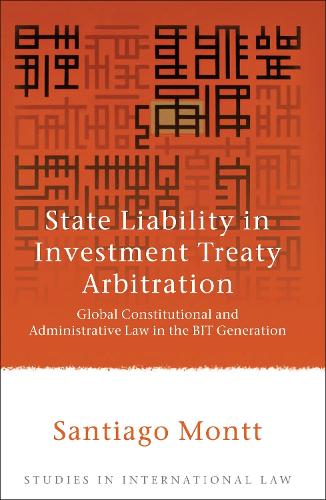
State Liability in Investment Treaty Arbitration: Global Constitutional and Administrative Law in the BIT Generation
(Paperback)
Available Formats
Publishing Details
State Liability in Investment Treaty Arbitration: Global Constitutional and Administrative Law in the BIT Generation
By (Author) Santiago Montt
Bloomsbury Publishing PLC
Hart Publishing
31st January 2012
United Kingdom
Classifications
Tertiary Education
Non Fiction
346.092
Physical Properties
Paperback
460
Width 156mm, Height 232mm, Spine 26mm
700g
Description
Today there are more than 2,500 bilateral investment treaties (BITs) around the world. Most of these investment protection treaties offer foreign investors a direct cause of action to claim damages against host-states before international arbitral tribunals. This procedure, together with the requirement of compensation in indirect expropriations and the fair and equitable treatment standard, have transformed the way we think about state liability in international law. We live in the BIT generation, a world where BITs define the scope and conditions according to which states are economically accountable for the consequences of regulatory change and administrative action. Investment arbitration in the BIT generation carries new functions which pose unprecedented normative challenges, such as the arbitral bodies established to resolve investor/state disputes defining the relationship between property rights and the public interest. They also review state action for arbitrariness, and define the proper tests under which that review should proceed. State Liability in Investment Treaty Arbitration is an interdisciplinary work, aimed at academics and practitioners, which focuses on five key dimensions of BIT arbitration. First, it analyses the past practice of state responsibility for injuries to aliens, placing the BIT generation in historical perspective. Second, it develops a descriptive law-and-economics model that explains the proliferation of BITs, and why they are all worded so similarly. Third, it addresses the legitimacy deficits of this new form of dispute settlement, weighing its potential advantages and democratic shortfalls. Fourth, it gives a comparative overview of the universal tension between property rights and the public interest, and the problems and challenges associated with liability grounded in illegal and arbitrary state action. Finally, it presents a detailed legal study of the current state of BIT jurisprudence regarding indirect expropriations and the fair and equitable treatment clause.
Reviews
State Liability in Investment Arbitration is a valuable and truly interdisciplinary contribution to the growing body of literature on international investment law. It offers novel analytical approaches to analyzing the emergence and evolution of the BIT generation, and sheds light on some of the hitherto less explored issues of state liability for interference with foreign investment. Mavluda Sattorova Transnational Dispute Management 1875-4120, March 2010 This book is very interesting contribution to the current debate over the legitimacy and effects of investment-related arbitration. More than a simple description or a study of technical issues, the author's observations on the process of investment arbitration are intellectually stimulating. Moreover, without sliding into an ideological debate, the author presents a serious study of the current state of investment law, carried out with conviction. Revue de droit affaires internationales March 2010 Montt's style is welcomingly direct. He outlines the structure of the book by chapter section, provides a suitably limited background for his claims and regularly concludes with succinct summaries. State Liability in Investment Treaty Arbitration does not provide any practical answers to this dilemma but is a commendable work regardless because of its clear and careful framing of the enormous impact of investment arbitration on the internal governance of the states that have committed to the increasingly universal BIT bargain. David Collins Manchester Journal of Economic Law Volume 7, Issue 1, 2010 This study of Santiago Montt is a valuable contribution to the constantly growing body of literature in the field of international investment law and arbitration. The author offers new approaches to the diverse problems that have arisen with the ever growing number of bilateral investment treaties and their interpretation by arbitral tribunals. Montt's effort to broaden the view and to look at these issues through the lens of comparative constitutional and administrative law should certainly attract the interest of investment practitioners and scholars alike. Christina Knahr ICL Journal Volume 4, March 2010 The book is widely supported with authorities and references. In every subject, Montt excels at combining the historical perspective, the conceptual analysis and a critical look at the future. His work has an unquestionable intellectual and academic value. Were I to recommend it, then I would surely do to scholars and researchers. Albert Badia Journal of World Energy Law and Business Volume 4, Issue 1
Author Bio
Santiago Montt has a JSD and an LLM from Yale University, an MPP from Princeton University, and an LLB from Universidad de Chile, and has taught administrative law and international commercial arbitration at Universidad de Chile, and competition law at Universidad Diego Portales.
